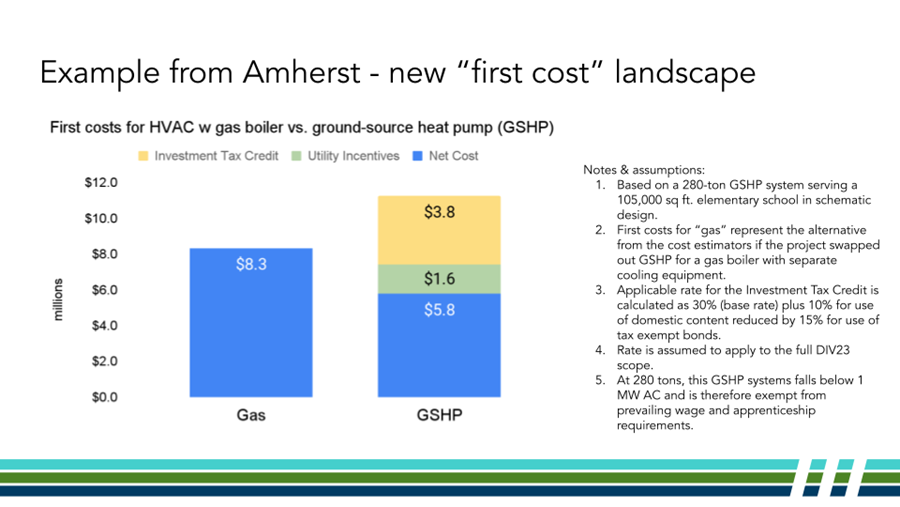Our schools can’t afford fossil fuels. Let’s spread the word.
Did you know that the Inflation Reduction Act (IRA) offers schools a huge opportunity to replace fossil-fuel burning HVAC systems with new ground-source heat pumps at up to a 50% discount? These incentives offer schools a once-in-a-generation opportunity — and we need your help getting the word out.
Schools can get heat pumps at a discount thanks to the IRA
Thanks to improvements delivered by the IRA, the Investment Tax Credit now supports direct cash payments to schools that install ground-source heat pumps. To see just how valuable these new incentives are, check out this example from Amherst. After federal credits and recently enhanced utility incentives, a new ground-source heat pump system is expected to cost the community $5.8 million to install. By contrast, a conventional gas-boiler system with separate air-conditioning units would cost $8.3 million.
This new reality runs against the conventional belief that gas boilers are the cost-effective option and “green” is just too expensive. Gas is now the more expensive choice — both upfront and over the course of an HVAC system’s 20-year lifespan.
This means it’s now more cost-effective than ever to keep tons of unnecessary carbon emissions out of the atmosphere, reduce air pollution, mitigate the risk of gas leaks, and expand much-needed cooling in our schools.
The Amherst example is a new construction project, but ground-source heat pumps can also be more cost-effective than gas boilers when it comes to renovation projects. Check out the evidence from Buckley Elementary just across the border in Connecticut.
Massachusetts schools should be taking advantage of these incentives today. The Investment Tax Credit is available to all building owners who install ground-source heat pumps. No competitive application processes. No funding caps. If 300 of our schools installed ground-source heat pumps over the next decade (something we surely need to do to comply with our climate law), Massachusetts would be leveraging more than $1 billion in federal support to make it happen.
So, how can we help districts in our state get organized to take advantage of these federal funds?
We can do better as a state, getting the word out about the supports and funding available to schools looking to make the transition to greener, healthier, more efficient, and ultimately more cost-effective facilities. This can start with the Massachusetts School Building Authority (MSBA). When the MSBA invites communities into the school construction process, the agency can connect the dots between HVAC system choices, the state’s climate law, and opportunities to take advantage of federal IRA funds. We know exactly which communities are about to make these important decisions. Now is the time for coordinated outreach!
The MSBA can also leverage its nearly two decades as a major player in school construction projects to play a transformative role in helping designers, construction managers, and owner’s project managers (OPMs) who work on schools embrace change. An MSBA Roundtable on the new federal incentives, for example, would help these critical players level up their understanding and provide better advice to schools.
And, municipal leaders have called for the MSBA to update its funding requirements to eliminate gas boilers from program eligibility. This move would be in line with the state’s Clean Energy and Climate Plan which highlights the need to ensure our “state-aided buildings” (K-12 schools & libraries) align with our 2050 Net Zero limit and climate resilience goals.
This is a call to action for the MSBA.
We have a lot of work ahead if we’re going to meet our state’s 2030 goal, but the momentum is on our side. Just this week the House Ways and Means released a budget proposal that includes a new $100M grant program — Green School Works — to support clean energy infrastructure at schools. This program would be an invaluable step forward in this work and could help to ensure that all communities enjoy the benefits of clean energy. In order to ease the administrative burden on communities, we recommend that this program be administered by the Massachusetts School Building Authority and integrated into existing school construction programs.
We’re counting on you to help us get the word out. Is your town planning to build a new school, renovate an existing school or invest in repairs to existing fossil fuel HVAC systems? Share this with your school facilities leaders, your school business officer, your town capital planning staff, and your town sustainability managers.

